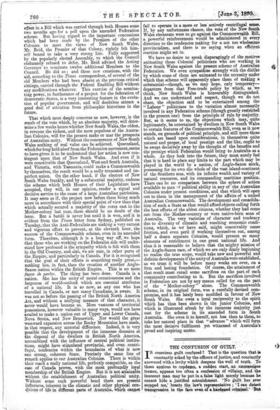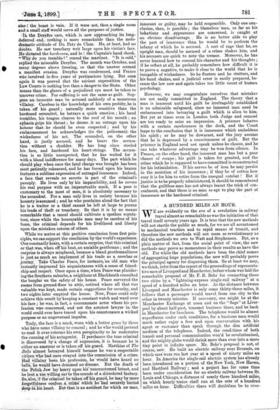THE CONFUSION OF GUILT.
IS conscious guilt confused ? That is the question thatis constantly asked by the officers of justice, and constantly answered with levity which deepens the well of truth. "To those anxious to condemn, a suditen start„an unconscious tremor, appears, too often a confession of villainy, and the innocent man may be put in a false' light merely because he cannot hide a justified astonishment. 'No guilt has ever escaped ,boasts laW's representative ; I can detect tiinagresaion in t4efiie 'even of a hardened criminal.' But alas ! the boast is vain.:. If : it were not, then a single room audit small staff would serve all the purposes of justice.
:In the breifils ease, which: is -now. approaching its long- deferred end, nothing is more remarkable than the melo- dramtic attitude of Du Paty de Clam: He, at least, had no doubts. He saw treachery writ large upon bis victim's face. He dictated the bordereau, and lo ! the Captain's hand shook. "Why do you tremble ? ". roared the .martinet. '` It is cold," replied the miserable Dreyfus.' -.The month was October. and many, 'degrees above freezing, so that' the...answer seemed a manifest evasion. Dreyfus was condemned, and Fiance Witi involved- in.five: years of pertinacious lying. But once again it was proved that the ancient superstition of the Law Courts is nothing less than a danger to the State. Other means than the glance of a prejudiced eye must be taken to uncover crime. For suffering is not the same as guilt. Sup- pose- an innocent man .be accused suddenly of a monstrous villainy. Careless in the knowledge of his own probity, he is taken: off his guard ; naturally more sensitive than the hardened scoundrel, he b.etiays:a quick emotion ; his hand trembles, his tongue. cleaves to the roof of his mouth ; an aPhisia.grips his throat ; he deems . it an outrage upon his hOnour that he should be even suspected ; and by his embarrassment he acknowledges (to the .. policeman). the wickedness of his act. The scoundrel, on the other band, is justly accused, and he hears the, accusa- tion •without a shudder. He has long since steeled his . face, and hardened • his heart-strings. . The . accusa- tion is so little unexpected, that he has waited for it with a bland indifference for many days. The part whichle should play, when once the fatal charge was brought has been most patiently rehearsed, and he has forced upon his brazen features a sublime expression of outraged innocence. Indeed, a face, that reveals no secrets is part of the criminal's panoply. He lives only by his impassibility, and he covers his real purpose with an impenetrable mask. If a ,pose is customary to the most of men, it is absolutely necessary to the Scoundrel. , 'For a man only lives in society because his honesty,is assumed ; and he who proclaims aloud the fact that he is a traitor or a thief cannot be left at large to pursue his trade of 'theft or treachery. So' that it is by no means remarkable that a rascal should cultivate a spotless reputa- tion, since while the honourable man may be careless of his fanie, 'the criminal 'depends for his livelihood and liberty upon the mistaken esteem of others.
While'ie arrive at this positive conclusion from first prin- ciples, we can support the conclusion by the world's experience. One constantly hears, with a certain surprise, that this criminal or that .was, when off his beat, an amiable gentleman ; and the surprise is always misplaced, because a bland gentlemanliness is just, as much an implement-of his trade as a crowbar or jemmy. ', Take Charles Peace, for instanee;an .man who instantly_ impressed his aequaintances with a sense of friend- ship and' respect. Once upon a time, when Peace was plunder; ing the Southern suburbs, a neighbour at Blackheath consulted the burglar on the safety, of his house. Peace surveyed the rooms from ground-floor to attic, 'noticed where all that was valuable was kept, made certain suggestions for security,, and two nights later emptied the house. Now, Peace could only achieve this result by a constant watch and ward over his face ; he was, in fact, a consummate actor where his pro- fession was concerned,. and • not the astuteat lawyer - in • the world could ever have traced upon his countenance a wicked purpose or an ungoverned impulse. .
Truly, the' face is a mask, worn with a better grace by those who.have some villainy to conceal ; and he who would pretend to read' it OVer-esteems his own perspicacity as he underrates the 'cunning of his antagonist. , If perchance the true criminal is discovered by change' 'expression, it is because he is either an amateur or is taken off his guard. Matthias of The Bells 'almost iietrayed. himself because he: was a respectable .-citiken who had once strayed into the commission of a crime. Had villainy been , his profession, he" Would :Mire: heard no belli; he would have dreained no dreams. But the death of the Polish Jew lay heavy upon hif'unitccustomedbreaSt, and he lent a too Willingseitito the sounds of a diSaidered fantasy. So, also, if the' criminal be .taken off his guaid, he may by. Mere forgetfulness confess_A...eatiF Which' he liad seentely, Wiled deep in.hia heart. But that is:an accident for which ner-man, . _ innocent or guilty, may be held responsible. Only one con- clusion, then, is possible ; the blameless-man, so far as his behaiiour and . appearance are concerned, is caught. at an obvious disadvantage. He is no better able to play the part of innocence than he would be to perform the infamy of which he is accused. A sort of rage that he, an upright man, should be accused of a crime shakes him, and his accusers are quick to note. the tremor. Moreover, .1e has never learned how to conceal his character and his thoughts ; if be reflect at all, he probably remembers how difficult it is to prove a negative, to make it clear to the world that he is incapable of wickedness. So he flusters and he . stutters, and his hand shakes, and a judicial error is easily prepared, be- cause the law now and again takes too little count of human psychology.
However, we may congratulate ourselves that mistakes are not easily Committed in England. The theOry that a man is innocent until his guilt be irrefragably established is 'an admirable safeguard, since no innocent man need be embarrassed into betraying a guilt which is alien to him. But yet at times even in London both Judge and counsel are too ready to seize an impression. A prisoner behaves with a certain carelessness in the dock, and the Court leaps to the conclusion that it is innocence which emboldens his spirit ; or he may be downcast, and the jury assume that he' is depressed by a consciousness of guilt. But the prisinier in England need not speak unless he chooSe, and he can take whatever advantage may be won from- silenee. In France, on the other hand, the innocent man has but a poor chance of escape ; his guilt is taken for granted, and, the crime which he is supposed to have committed is reconstructed foi his intimidation. If his nerves be of iron he may persist in the assertion of his innocence ; if they be of cotton how easy it is for him to retire from the unequal combat ! But 'if justice is to be properly administered, it should be remembered that the guiltless man has not always learnt' the trick of con- cealment, and that there is no man so apt' to play the part of innocence as the hardened criminal.







































 Previous page
Previous page